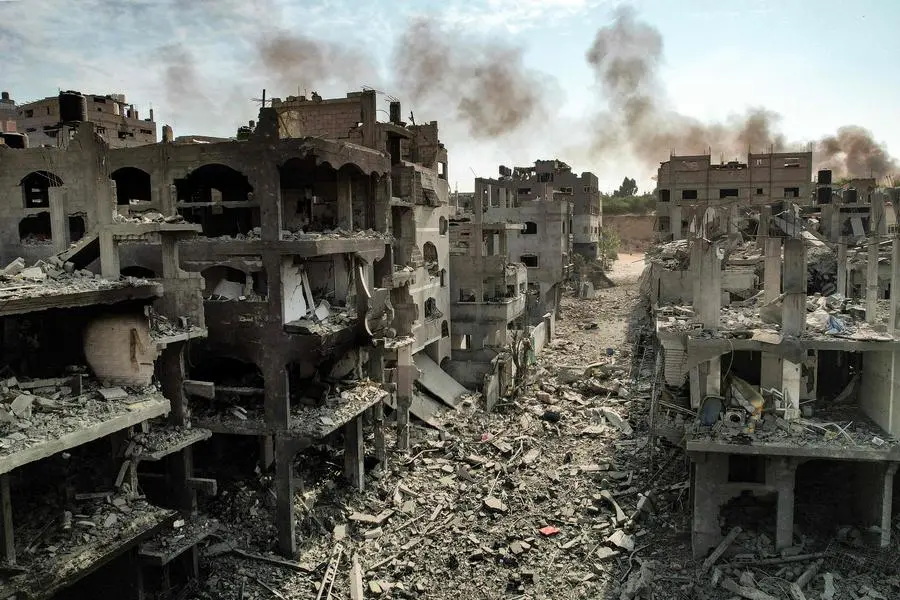PHOTO
Israel pressed its offensive in Gaza on Friday despite mounting international calls for restraint, with key backer the United States saying the war to crush Hamas must not lead to a long-term Israeli occupation of the territory.
The war began after Hamas launched an unprecedented attack on Israel on October 7 that Israeli officials say killed about 1,200 people, mostly civilians.
Vowing to destroy Hamas and bring home an estimated 250 hostages taken by militants into Gaza, Israel launched a massive military offensive that has left much of the besieged territory in ruins.
The health ministry in the Hamas-run Gaza Strip says the war has killed more than 18,700 people, mostly women and children.
AFP reporters said a school containing displaced people in the southern city of Khan Yunis was hit Friday, and saw ambulances recovering at least three dead, including a child.
Late Thursday in the southern city of Rafah near the Egyptian border, crowds of Palestinians used flashlights to search under the rubble of buildings for survivors following an Israeli strike.
"This is a residential neighbourhood, women and children live here, as you can see," said resident Abu Omar. "Three missiles on a residential neighbourhood that has nothing to do with any militant activities."
Israeli military spokesman Daniel Hagari said troops were engaged in fighting with militants in two districts of Gaza City late Thursday.
"There will be more tough battles in the days to come," he said.
- 'We will destroy them' -
The Israeli army said Friday that 117 troops had died in Gaza since the start of the ground offensive.
It said the body of a French-Israeli hostage kidnapped on October 7, Elia Toledano, was recovered and returned to Israel.
"We are working together with security agencies, and with all intelligence and operational means in order to return all of the hostages home," the army said.
The United States, which provides billions of dollars in military aid to Israel, has strongly backed its response to Hamas's attacks, but has voiced increasing concern over civilian casualties and the long-term plan for Gaza.
"We do not believe that it makes sense for Israel, or is right for Israel, to... reoccupy Gaza over the long term," US National Security Advisor Jake Sullivan said Friday after meeting with Israeli Prime Minister Benjamin Netanyahu and Defence Minister Yoav Gallant in Tel Aviv.
Gallant warned that Israel's fight with Hamas "will require a period of time -- it will last more than several months, but we will win and we will destroy them".
In Washington, US President Joe Biden urged Israel to take more care to protect civilians in Gaza.
"I want them to be focused on how to save civilian lives -- not stop going after Hamas, but be more careful," said Biden.
But Netanyahu vowed to carry on "until victory", and Foreign Minister Eli Cohen said the war would continue "with or without international support".
- 'Desperate, hungry, terrified' -
Sullivan headed to the Israeli-occupied West Bank on Friday for talks with its Palestinian Authority (PA) leaders, who have lost even more public support since the war in Gaza.
The West Bank, where the PA exercises limited control, has seen a surge in violence since October 7.
There, the Palestinian health ministry said 11 people had been killed since the Israeli military launched a raid in the city of Jenin and its refugee camp earlier this week.
The war in Gaza has led to increased popular support for Hamas in the West Bank, further weakening the internationally recognised PA.
This week, the United Nations General Assembly overwhelmingly supported a non-binding resolution for a ceasefire in Gaza, with Washington voting against it.
The UN estimates 1.9 million of Gaza's 2.4 million people have been displaced, and the head of its agency for Palestinian refugees, Philippe Lazzarini, warned of a "breakdown of civil order".
"Everywhere you go, people are desperate, hungry and terrified," said Lazzarini, who recently returned from Gaza.
- Huthi attack -
The UN humanitarian agency OCHA says more than a third of households have reported severe hunger, while more than 90 percent are "going to bed hungry".
Adding to the desperation, mobile and internet communications were cut Thursday and yet to return the following day, with operator Paltel blaming "the cut off of main fibre routes from the Israeli side".
"Gaza is... blacked out again," PalTel said, with global network monitor Netblocks confirming the blackout.
Hamas's media office described it as a "premeditated crime that deepens the humanitarian crisis" by making it harder for rescuers to reach injured people.
Aid distribution has largely stopped in most of Gaza, except on a limited basis in the Rafah area, according to the UN.
COGAT, the Israeli defence ministry body responsible for Palestinian civilian affairs, said the military "is enabling tactical pauses for humanitarian purposes".
Fears of a wider regional conflagration persist, and Yemen's Huthi rebels struck a cargo ship in the Red Sea on Friday, causing a fire on deck in the latest of a near-daily series of attacks in the commercially vital waterway.
The Iran-backed Huthis, who control much of Yemen but are not recognised internationally, say they're targeting shipping to pressure Israel during its war with Hamas.
"While the Huthis are pulling the trigger, so to speak, they're being handed the gun by Iran," said Sullivan.





















